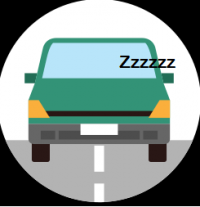
By Miriam Raftery
March 16, 2014 (San Diego’s East County) – “My wife, Robyn, died when she fell asleep while driving on April 6, 1999 in Texas,” retired California Highway Patrol Officer Phil Konstantin recalls. “She was driving back to San Diego from Florida, where she had just picked up a car from her mother.”
Since then, Konstantin has championed the cause of warning others about the dangers of driving drowsy. In 2005, the California Legislature proclaimed April 6th—the date Robyn Konstantin died –as Drowsy Driver Awareness Day.
On Monday, March 17, Konstantin will be a guest on the East County Magazine Radio Show. Tune in at 5 p.m. on KNSJ 89.1 FM.
“I have always found it to be ironic that one of my duties as a California Highway Patrol officer was to inform the public of the dangers of driving while drowsy. Yet, this is how my own wife died,” Konstantin says. “She was an excellent driver. This just proves it can happen to anyone.” Ironically, she drove past a freeway rest area just moments before her crash, he added. You can learn more at his website: http://drowsydriverawarenessday.com and by scrolling down in this article.
Hundreds of people are killed each year when someone falls asleep while driving, and many more are injured.
The National Highway Traffic Safety Administration estimates that 2.5% of fatal crashes and 2% of injury crashes involve drowsy driving.2 These estimates are probably low. The exact numbers are hard to determine because if the driver dies there is no one to say what happened. If the driver lives, they might not admit to why they crashed.
Surveys show that most drivers have driven while drowsy or fatigued at least once in their life. In fact, this happens to more than a third of all drivers during any given month.
Driving drowsy can impair your driving ability as much as alcohol. The Centers for Disease Control reports that Cognitive impairment after approximately 18 hours awake is similar to that of someone with a blood alcohol content of 0.05%. After about 24 hours awake, impairment is equivalent to a blood alcohol content of 0.10%, higher than the legal limit in all states.
Alcohol, even in small amounts, amplifies the effects of inadequate sleep. Sedative drugs also compound the problem.
Know the warning signs of drowsy driving:
- Yawning or blinking frequently.
- Difficulty remembering the past few miles driven.
- Missing your exit.
- Drifting from your lane.
- Hitting a rumble strip.
For more warning signs visit the National Sleep Foundation's Drowsy Driving web site.
If you experience any of these warning signs, pull over to rest or change drivers. Stopping for coffee may help, but only provides short-term alertness. Better yet, get some sleep.
Prevent accidents caused by driving drowsy:
- Get enough sleep! According to the National Institutes of Health, adults need 7 or 8 hours of sleep a day, while adolescents need 9 or 10 hours.
- If you have a sleep disorder, make sure to seek treatment.
- Refrain from drinking alcohol or taking sedating medications before driving.
- When planning a trip, get don’t plan to drive for excessively long hours. Allow time for rest breaks every two hours and overnight stops. Get a good night sleep before you leave.
- Listen to news or talk on the radio, or a favorite book on tape, rather than music to help stay alert.
For more information, visit:
Drowsy Driver Awareness Day website: http://drowsydriverawarenessday.com
PSAs by then-CHP Officer Phil Konstantin:
Drowsy Driving is as Dangerous as Drunk Driving: http://www.sr22insurancequotes.org/drowsy-driving/
Drowsy Driving: Asleep at the Wheel (CDC website): http://www.cdc.gov/features/dsdrowsydriving/
Research on Drowsy Driving (Federal Traffic Safety website): https://www.nhtsa.gov/risky-driving/distracted-driving
More data and tips on how to avoid distracted driving: http://www.sr22insurance.net/distracted-driving/
National Sleep Foundation websites: http://drowsydriving.org/
http://sleepfoundation.org/sleep-topics/drowsy-driving
Federal Department of Transportation website http://www-nrd.nhtsa.dot.gov/pubs/811449.pdf
CHP Brochure: http://americanindian.net/DDADCHPE.html







Comments
Drowzy
True, drowsy driving can affect anyone.